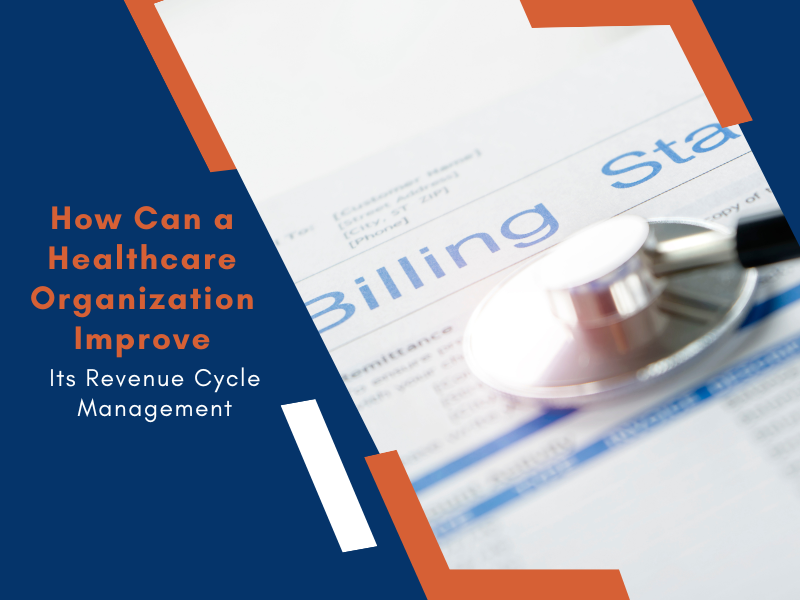Efficient revenue cycle management (RCM) is crucial for the financial health of any healthcare organization. By optimizing the revenue cycle, organizations can ensure timely reimbursements, reduce financial strain, and maintain smooth operations. This blog explores strategies that healthcare organizations can implement to improve their RCM, enabling better financial performance and enhanced patient care.
What Is Revenue Cycle Management in Healthcare?
Revenue cycle management encompasses all administrative and clinical functions involved in capturing, managing, and collecting patient service revenue. From appointment scheduling and insurance verification to claim submission and payment collection, RCM ensures that healthcare organizations receive timely compensation for services rendered.
Effective RCM processes streamline workflows, minimize errors, and reduce claim denials, contributing to the financial stability of a healthcare organization.
Challenges Healthcare Organizations Face in RCM
Healthcare organizations often encounter various obstacles in their revenue cycle, including:
- Complexity of Insurance Billing
Managing multiple payers with varying policies and reimbursement requirements can lead to delays and errors in claim processing. - Rising Denial Rates
Incorrect coding, incomplete documentation, or errors in patient information often result in claim denials, delaying revenue collection. - Technological Limitations
Many organizations still rely on outdated systems that lack integration capabilities, leading to inefficiencies in RCM processes. - Patient Payment Responsibility
As patients bear a larger share of healthcare costs, ensuring timely collection of copays and deductibles becomes increasingly challenging.
Strategies to Improve Revenue Cycle Management
Healthcare organizations can overcome these challenges by adopting the following strategies:
1. Leverage Advanced Technology Solutions
Modern technology plays a vital role in optimizing the revenue cycle. Implementing robust RCM software can automate processes like patient registration, insurance verification, and claim submission.
- Benefits of Automation:
- Reduces manual errors.
- Speeds up claim processing.
- Improves patient data accuracy.
By integrating electronic health records (EHR) with RCM systems, healthcare organizations can streamline communication between clinical and administrative departments.
2. Focus on Accurate Medical Coding
Medical coding errors are a common cause of claim denials. Training staff on the latest coding guidelines and leveraging certified medical coders ensures accuracy and compliance with payer requirements.
- Best Practices for Coding:
- Regularly update staff on changes in coding regulations.
- Conduct routine audits to identify and rectify errors.
Investing in certified coders not only reduces denials but also accelerates reimbursement timelines, positively impacting cash flow.
3. Strengthen Insurance Verification Processes
Insurance verification at the time of patient registration is critical to reducing denials. Verifying coverage details, eligibility, and prior authorization requirements minimizes delays in claim approvals.
- How to Improve Insurance Verification:
- Use automated tools to check eligibility in real time.
- Train front-end staff to capture complete and accurate patient information.
Proactive verification reduces the chances of billing complications later in the cycle.
4. Minimize Claim Denials
Addressing the root causes of claim denials can significantly improve the revenue cycle. Common reasons include missing documentation, coding errors, and incorrect patient information.
- Steps to Reduce Denials:
- Implement robust denial management systems to identify trends.
- Establish a dedicated team to track, appeal, and resolve denied claims.
Regular monitoring and follow-up ensure that denied claims are addressed promptly, minimizing revenue loss.
5. Optimize Patient Payment Collection
With patients shouldering a greater share of healthcare costs, organizations must prioritize patient payment collection. Transparent communication about financial responsibilities fosters trust and improves collection rates.
- Best Practices for Patient Payments:
- Offer multiple payment options, including online portals.
- Provide detailed, easy-to-understand billing statements.
- Implement pre-service payment collection policies.
Engaging patients early and clearly in the billing process reduces unpaid balances.
6. Regularly Monitor Key Performance Indicators (KPIs)
Tracking KPIs helps healthcare organizations evaluate the effectiveness of their RCM processes.
- Critical KPIs to Monitor:
- Claim denial rates.
- Average days in accounts receivable (AR).
- Net collection rate.
Analyzing these metrics allows organizations to identify bottlenecks and take corrective actions to enhance revenue cycle performance.
7. Partner with Professional RCM Experts
Many healthcare organizations find it beneficial to outsource RCM processes to specialized firms. RCM experts provide the expertise and resources needed to streamline workflows, enhance coding accuracy, and reduce claim denials.
- Advantages of Outsourcing RCM:
- Access to experienced professionals.
- Cost-effective solutions.
- Improved compliance with regulatory standards.
The Role of Leadership in RCM Improvement
Leadership plays a crucial role in driving RCM optimization. By fostering a culture of accountability, healthcare organizations can ensure that all staff members—from front-office personnel to billing specialists—are aligned with revenue cycle goals.
Regular training sessions, performance evaluations, and cross-departmental collaboration create an environment where RCM processes thrive.
Emphasizing Patient-Centric RCM
Improving RCM isn’t just about revenue; it’s also about enhancing patient satisfaction. Clear communication, transparency in billing, and streamlined processes contribute to a positive patient experience, ultimately fostering loyalty and trust.
Healthcare organizations that prioritize patient needs in their RCM strategies often see improved financial outcomes and stronger relationships with their patients.
Conclusion: Apaana Healthcare—Your Trusted Partner in RCM
Optimizing revenue cycle management is essential for every healthcare organization aiming to achieve financial stability and deliver superior patient care. By leveraging advanced technologies, improving coding accuracy, and adopting patient-centric strategies, organizations can transform their RCM processes.
For healthcare organizations seeking a trusted partner in revenue cycle management, Apaana Healthcare offers unmatched expertise.
Apaana Healthcare drives operational excellence with global healthcare management solutions. We specialize in outsourced services for health plans, covering member enrollment, claims administration, medical billing & coding, and provider engagement. Our cost-effective solutions ensure streamlined operations and improved financial performance for clients like you.
Take the first step toward better RCM—partner with Apaana Healthcare today!





